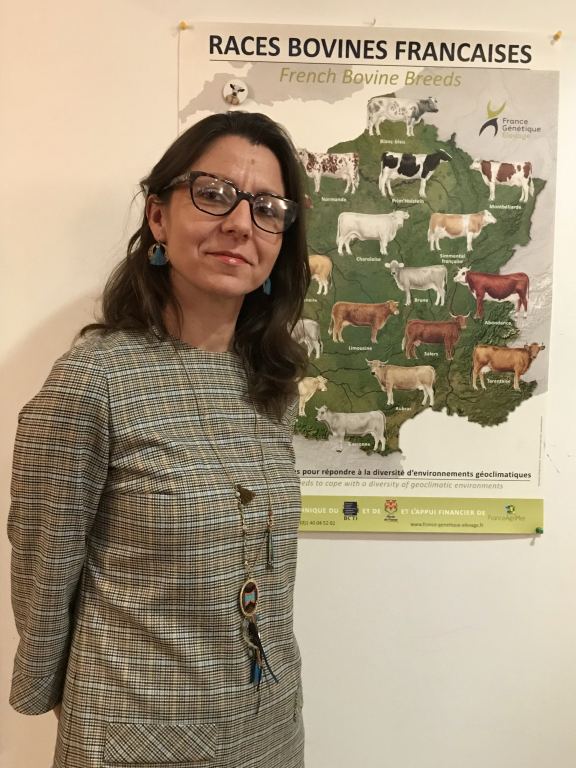 The guest of our column today is Katia ROINET, the advisor of the Ambassador of the French Republic in the Russian Federation on Agriculture in Russia, Kazakhstan, Belarus, Armenia, Uzbekistan, Tajikistan and Kyrgyzstan.
The guest of our column today is Katia ROINET, the advisor of the Ambassador of the French Republic in the Russian Federation on Agriculture in Russia, Kazakhstan, Belarus, Armenia, Uzbekistan, Tajikistan and Kyrgyzstan.
- Good afternoon, Ms. ROINET!
- Good afternoon!
- Today Russia is actively forming industrial clusters in various spheres of the economy. And readers of our website are interested in learning about the established practice in foreign countries. Naturally, France as one of the leading economies of the world is no exception.
- Of course, clusters exist in France, they function in different sectors of the economy. We call them Competitiveness Centers. This concept was fixed in 2005, today the total number of such Competitiveness Centers in France is 67.
- Including the agro-industrial sector?
- Yes, eleven Competitiveness Centers carry out activities in the field of agriculture or the agro-food sector.
- Cluster in Russia is an association of large enterprises, well, or at least one or several core companies, plus SMEs, which cooperate primarily with the core companies. What is the difference between a cluster in France and a cluster in Russia?
- Competence Centers in France is a group of enterprises, mostly small in size, located in the same region and working in the same industry. But these ‘clusters’ include not only industrial companies, but also research and educational institutions. For example, we have a cluster specializing in seafood, another clusters specializes in horse breeding, in the field of forestry and wood processing, etc. These clusters allow, by developing synergy, to conquer markets that would not be accessible to individual enterprises.
- The economy of France is part of the EU economy. To what extent are the French agro-clusters linked to other EU countries?
- Our Competitiveness Centers include only French structures. But they are known all over the world.
- The Russian government is actively using subsidies and other financial and non-financial measures to regulate the agricultural sector. Does the French Government take measures of protectionism in relation to agricultural products produced in France?
- No, there are no protectionist measures in relation to their agricultural products in France. And the European Union is monitoring this. All subsidies or support measures provided by the French government to the agricultural sector are regulated by European acts: it is a common agricultural policy.
- That is, there are certain preferences, but this is already the competence level of the EU bodies?
- That's right. Although there is a small possibility of maneuvering the EU member states, this only applies to specific support. For example, assistance to farmers who operate in areas with difficult conditions, particularly in mountainous areas, or point assistance related to natural disasters. All this is very strictly regulated. Moreover, such support is unrelated, that is, it is not related to the volume of production.
- France is known for its advanced technologies and products. Almost all industrially developed countries have their own format for promoting technology and products abroad. How does the French authorities solve these problems?
- The French government stimulates the agricultural sector to export, technologies and equipment, or agro-food products. There are no subsidies for exports; moreover, this is not possible within the WTO. But we provide funding and guarantees. We advise, help enterprises, explaining the legislation and all the procedures that need to be met in order to deal with exports. We are opening up new markets, negotiating with the veterinary services of different countries about the sanitary conditions, in order to be able to export specific products.
- Well, if a French company decides to invest in another country?
- With regards to investments in foreign countries, we, of course, also help French companies that begin this way. There are no subsidies in this sector, but our Embassies answer all their questions, whether in the legislative, legal, social or tax spheres.
- Are French investors ready to consider the possibility of investing in Russia?
- Already a lot of French enterprises are represented in Russia, and not only in the agricultural sector. But there are enough projects in this sector too. Already there are Danone, Lactalis, Bonduelle, Auchan, Sucden, Soufflet, Lesaffre, Olmix. And the projects are continuing: Savencia dairy company has just invested in its first plant near Ufa in December 2017. Louis Dreyfus invests in a grain terminal in the deep waters of the Azov Sea. RUNGIS currently advises the construction of the largest wholesale market in Moscow, which will be located near Domodedovo. Investments are not retarded in this sector, but vice versa.
- Ms. ROINET, on behalf of Omsky Biocluster I want to thank you for an interesting conversation. Let Russia and France further develop joint projects, and we, as always, will help the business of our countries!
- Thank you!
Omsky Biocluster Press Secretary Ravshana Balloyeva

